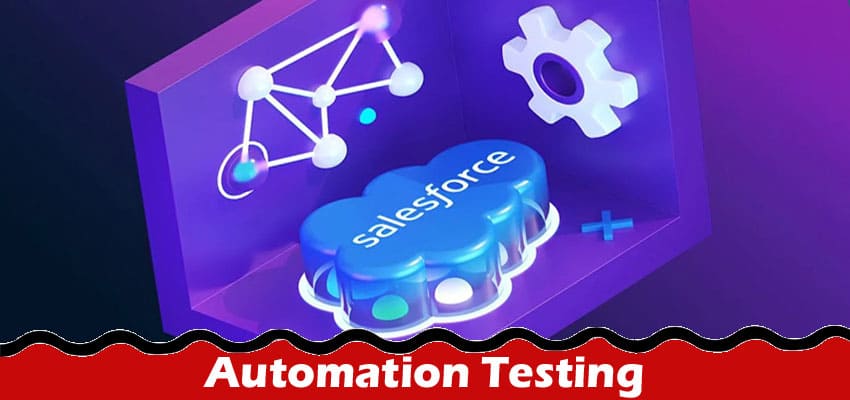Salesforce CRM is one of the renowned platforms in the market. It continuously releases updates for the enhancement of features and functionality to cater to growing needs of customers. Testing is one of the crucial aspects of effectively implementing frequent Salesforce releases.
Automation testing is an effective and recommended approach to test releases of Salesforce. It provides several benefits that can significantly improve the testing process and helps ensure the quality of Salesforce applications during releases. In this blog, we will identify why automation testing is the right way to test Salesforce releases. We will also analyze how to choose the right Salesforce automation tool.
Key Reasons: Why Automation Testing Is the Right Way to Test Salesforce Releases?
Speed and Efficiency
Automated tests can be executed faster than manual tests, enabling you to cover a maximum number of test cases in less period. This speed is especially valuable during the time-sensitive release process.
Repeatability and Consistency
Automated tests can be run repeatedly with consistent results, reducing the risk of human error in manual testing. It also ensures that the same tests can be applied consistently across multiple releases.
Increased Test Coverage
A wide range of scenarios can be covered and tested quickly through automation. Due to this, the test coverage can be improved. Moreover, it helps identify potential issues that manual testing might miss. Opkey is a no code test automation platform, and its One-click test creation feature immediately increases your test coverage without requiring programming knowledge. Owing to its no code automation, it is considered as one of the best platforms to test frequent Salesforce releases.
Complex Test Scenarios
Salesforce applications can involve complex workflows and business processes. Automation enables the testing of intricate scenarios that require specific data configurations and multiple steps to validate. For instance, Opkey is one of the well-known Salesforce tools in the market. Its codeless automation feature streamlines the testing process by leveraging advanced technology, like AI. The self-healing technology of Opkey ensures that when your apps change, your tests will not break.
Diverse Test Scenarios
Automation testing can be combined with data management tools to easily set up and manipulate test data. Due to this, diverse testing scenarios can be created without interfering with the production data. Moreover, Salesforce applications are often integrated with other systems and services, and automation facilitates end-to-end testing, ensuring that all components work in harmony after the Salesforce releases.
Resource Optimization and Cost Effective
Automated tests do not require constant human intervention, allowing testers to focus on more complex and exploratory testing tasks. Furthermore, if we see money-wise, there might be an initial investment in setting up and maintaining automated tests. In the long run, automation can save time and resources compared to manual testing.
Regression Testing
Salesforce releases often involve changes to the application, which may introduce new bugs or impact existing functionality. Automated regression tests can quickly identify and validate any regressions, ensuring new features do not break existing functionality.
How to Choose the Right Automation Tool for Salesforce?
- Ensure that the automation tool is designed specifically for testing Salesforce applications. It should have native support for testing various Salesforce elements like Apex, Visualforce pages, Lightning components, and Salesforce APIs.
- Evaluate the tool’s capability for test automation, including support for data-driven testing, test case management, test reporting, and integration with your testing framework.
- Check the scripting language supported by the automation tool. Some tools use proprietary scripting languages, while others support popular languages like JavaScript, Java, or Python. Additionally, codeless tools like Opkey, are built specifically for Salesforce and streamline testing by integrating technologies like AI. So, go with a tool that aligns with your team’s expertise.
- Ensure the tool can test your Salesforce application across different browsers and devices to ensure compatibility and responsiveness.
- If your Salesforce application handles sensitive data, ensure that the automation tool adheres to security best practices and compliance standards.
- Look for a tool with a user-friendly interface and intuitive features. Your team should be able to quickly learn and use the tool without significant training or expertise. For instance, Opkey is a codeless tool in the market comprising features like drag and drop and helps even non-technical users to participate in the testing.
- Read reviews and seek recommendations from other Salesforce users or testing professionals with experience with the automation tool you are considering.
Choose Opkey: A Tool to Navigate Salesforce Releases Faster and Accurately
In a nutshell, it can be concluded that automation testing is an effective and recommended approach to testing Salesforce releases. To streamline the automation testing and to evaluate the releases & updates accurately, Opkey is one of the best choices. It is a no-code test automation platform built primarily for Salesforce and covers all the needs by carrying out end-to-end testing. It automatically detects changes and maintains scripts to accommodate them.
The developer tools, dependency trees, and impact analysis Chrome extension help developers visualize every change before pushing it into the test environment, ensuring the production environment is error-free. Simply, it is a comprehensive tool for all your Salesforce needs. To know more about Opkey, you can schedule a free book and visit the website.


